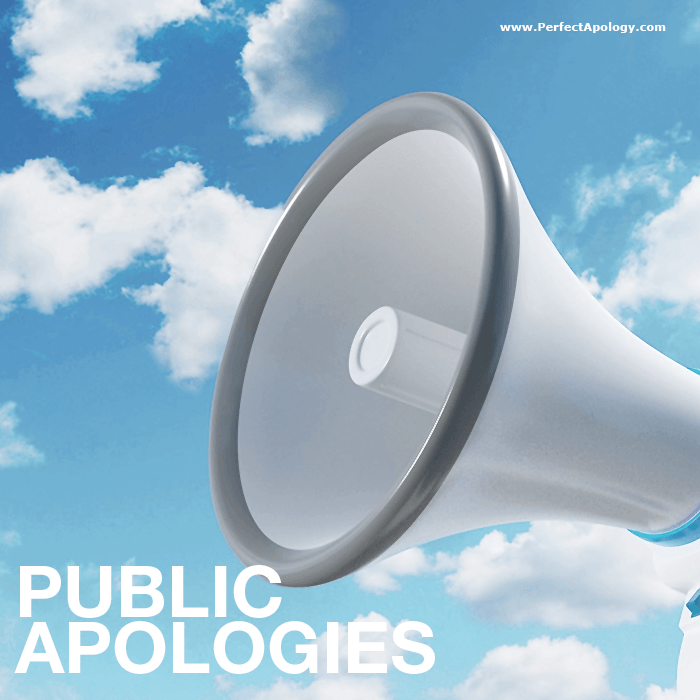The Public Apology | Famous Apologies
Extending a public apology is not very different from delivering a private one—the ingredients of any effective apology remain the same.
The only real difference is that some of these apologies can become famous in their own right, or make others infamous for screwing up.

A public apology delivered by celebrities and other well-known figures in the news and popular culture has an uncanny way of reminding us that 'to err' is human. It really doesn't matter who you are, at some point anyone can find themselves in the doghouse for something they said or did.
Lessons in Public Apologies
Public apologies know no boundaries. They extend from the Vatican, to the US Senate, to sports icons, corporations, Hollywood, and beyond.
Whether these apologies succeed or fail, a great deal can be learned from them, because they often provide great insight into the art of delivering the perfect apology.
For example, in January of 2020 Disney CEO Bob Iger issued a public apology via Twitter which ended up being a brilliant PR move and a lesson in corporate humility. Apparently, a local PTA chapter screened a Disney film as part of a fundraising event without permission. They were fined $250 by Disney's licensing agency.
Iger took to Twitter. He used his personal account to apologize and offer a personal donation. Iger tweets,
Our company @WaltDisneyCo apologizes to the Emerson Elementary School PTA and I will personally donate to their fund-raising initiative.
No question that the PTA was 'legally' in the wrong here and one needs to protect their copyright & intellectual property. However, in this case, it's the PTA of a local elementary school looking to raise funds.
$250 represents over 30% of what the PTA raised and is likely less than Disney's daily budget for staples at one of their parks.
An article at INC.com sums up the situation perfectly,
First of all, Iger's move cost him and the company almost nothing. And it was absolutely the right thing to do from the perspective of being a good human being. That said, it was also a brilliant way to show corporate humility, and turn a potential embarrassment into a win for everyone involved.
The free PR for Disney from this Iger tweet? Priceless.
For more on Disney, read our customer service case study and their perspective on apologizing.
Biggest Mistake People Make When Apologizing Publicly
Most public apologies almost never completely succeed, for a very simple reason: you can't please all of the people all of the time, no matter how meticulously and sincerely you follow the ingredients of a perfect apology.
Apologies are often accepted or rejected for political reasons and have almost nothing to do with the apology itself.On the other hand, personal mea culpas are almost always successful when the guidelines are followed, because you're dealing essentially with one person.
Keep in mind that very few apologies ever meet the 'perfection' standard, and some that are less-than-perfect work out just fine.
Also, there's a fine line between a perfect apology and groveling—we think JetBlue's public apology to customers is a great example of a CEO getting very close to the perfection mark without going over the line.
We raise the JetBlue apology because it does give you an idea of the benchmarks we use to identify a strong, credible, effective apology that meets most of the ingredients we emphasize throughout this site.
Of course, the most common mistake in most situations is the absence of one or more of the key ingredients.
And the two that are usually avoided are 'ownership/responsibility' (which directly relates to the use of passive voice 'mistakes were made' statements— and 'compensation/restitution.'
Both of these common omissions are usually the product of lawyers and public relations firms controlling spin to avoid further losses and or litigation, especially in a business setting.
Now, it's certainly true that many apologies are crafted by lawyers, but they rarely have to be. Few business errors, for example, result in any real harm to clients or produced any measurable costs that could serve as the basis for a credible (or actionable) legal case.
Apologies crafted by lawyers may deter some of the more determined (and misguided) customers from filing for damages, but the unintended consequence of issuing these very weak, legally scripted statements is that they often alienate (and lose) many more customers than they deter.
The Public Apology & Politics
Turning to politics, we take a look way back to 2006 and John Kerry. In a review of a public apology delivered by John Kerry we learn how not extending a complete apology from the outset can create more damage and hurt than the original offence.
In an article on Political Apologies & American Democracy we learn how a misstatement can sometimes gain momentum of its own and overshadow good intentions.
In a commentary by Peter F. Goolpacy, he asks Where are the Duke Apologies? following the debacle of three Duke University lacrosse students falsely accused of rape.
We also cover The Perfect Terrible Apology: A Case Study of David Shuster and MSNBC after Shuster posed an inappropriate (and offensive) question regarding Chelsea Clinton's role in her mother's campaign during an on-air political discussion. In the same article we learn why Don Imus' apology for insulting the Rutgers University Women's Basketball team (and the public at large) was doomed to fail.
Although not strictly political, the #MeToo movement offers further insight into what works and what doesn't, with many prominent men and public figures apologizing for their sexual misconduct in an annotated article titled Mea Culpa. Kinda Sorta. from the New York Times.
While on the topic, we've compiled a complete listing of quotes for Bill Clinton's public apologies following the Monica Lewinsky affair back in the late 90's.
It will be interesting to see if we, or anyone else, will ever need to compile a list of Donald Trump apologies.
Celebrities, Public Figures & Mea Culpas
Keep in mind that almost all celebrities and public figures have spin doctors and well-paid publicists backed by huge public relations firms. That's why their public apologies are so fascinating to witness.
Even the largest public relations firms will mess up occasionally and overlook the straightforward strategies outlined in this web site.
Not all of the public apologies we've witnessed have been ineffective, some did seem sincere and genuinely heartfelt, David Letterman's two apologies (linked further down the page) come to mind. But most illustrated the fine art of avoiding an apology and failed to include many of the critical ingredients of a successful apology.
One the most notable 'non-apology' apologies dates back to 2006 and goes to the late Rush Limbaugh and his efforts to backtrack after confronting Michael J. Fox for "exaggerating the effects of Parkinson's disease."
I will bigly, hugely admit that I was wrong, and I will apologize to Michael J. Fox if I am wrong in characterizing his behavior on this commercial as an act.
In other words, IF I am wrong I will apologize. Of course, there is really no obvious and easy way to confirm or refute the thesis, so the issue died. Rush Limbaugh lost very few supporters as a result of this mistake, and even less sleep. But even for you...really, Rush?
Even Popes Issue Public Apologies
Some public mistakes can be extremely difficult to correct—such as Pope Benedict XVI's obscure quotation from a 14th-Century Christian emperor in a speech at a German university in September, 2006.
Show me just what Muhammad brought that was new and there you will find things only evil and inhuman, such as his command to spread by the sword the faith he preached.
The Pope was accused of insulting followers of the Islamic faith and, more importantly, the Prophet Mohammed himself for violent elements within Islam. He resigned in 2013 and given the wisdom of his successor Pope Francis, we couldn't envision him ever having to apologize.
But Pope Francis is human like the rest of us and in 2020 he issued an apology for losing his patience and slapping the hand of a woman who was pulling him towards her.
Public Apologies Covered In The Media
Public apologies are a consequence of being in the public eye and making mistakes is a part of being human. So when that mistake is broadcast across the media, so must be the apology.
The 21st Century has been a testament to being human and apologizing. Just ask the Pope, Mel Gibson, Tom Cruise, Mark Foley, Michael Richards, Miss America... and the list goes on and on.
There have been so many masterfully crafted public apologies by various personalities that before we even finished discussing Tom Cruise's apology to Brooke Shields over her use of anti-depressants to control post-partum depression, Mark Foley comes along with an 'apology' delivered by his lawyers for his sexual antics over email.
The statement claimed that he was gay, abused by a clergyman as a teenager, and had problems with alcohol—it remains a mystery to most intelligent observers how any of this is even remotely relevant to engaging under age congressional pages in sexually explicit computer messages.
Some major mistakes, such as Mel Gibson's anti-Semitic remarks to California police officers, are apparently not that difficult to correct—his movie Apocalypto (released after the incident in 2006) did very well despite the public backlash against his remarks.
But karma has a way of getting back at you and since then, Gibson's been divorced twice and dropped by his talent agency as patterns of racism, sexism and anti-Semetism emerged over the following years.
By 2015 Gibson was said to be delighted to be potentially nominated for the spoof Golden Raspberry Awards—an award that most dread winning. But then again, he just may be delighted that people are talking about him at all.
Unfortunately his poor behavior and clearly racist, sexist comments hasn't prevented him from making somewhat of a comeback over the years.
Given the sorry state of public apologies, the media has become increasibly interested in figuring out what's going on. A Q & A session we had, with a reporter from the Sacramento Bee highlights this point.
We found the reporter's question fascinating and thought we would share it (and our answer) with you.
Q Regarding the recent celebrity trend of apologizing and then going directly into some form of rehab: Is that merely a cynical ploy to deflect blame or a heartfelt act? Do you think the public can see through the quasi-apologies of Michael Richards, Mel Gibson, Mark Foley, etc.
Judging by how long it takes many of these celebrities to recover while in rehab we think most people are bright enough (and cynical enough) to understand that these press releases are not really about recovering from an addiction—they're designed to help the celebrity recover from the disastrous public relations hit he/she took as a result of the mistake, addiction, statement, etc.
Although obvious, the automatic rehab strategy actually works in most cases to control, distract or redirect the negative press, because the media rarely follows the story beyond the rehab entry stage and the relative press coverage (post-rehab) is non-existent or minimal at best.
But occasionally the entry into rehab does more to confuse rather than reassure the celebrity's fans, as when Isaiah Washington (star of Grey's Anatomy) apologized for outing his co-actor T.R. Knight by using the 'f----t' word, and then entered counselling/rehab. It was never really made clear how this solution was at all relevant to this particular infraction and what the rehab program would entail (or fix).
With respect to your question about Richards, Gibson and Foley, we at PA repeatedly stress how important it is to include all of the ingredients of a perfect apology if you're serious about increasing the probability of having your apology accepted.
But we also point out that the probability of success or failure is not exclusively a function of following these 'perfect apology' guidelines—e.g., a description of the error; acknowledgment of the offense; acceptance of responsibility; a willingness to own the mistake; an explanation; regret, humility and remorse; a request to be forgiven; a credible effort to prevent the error from happening again; and some form of compensation.
Some apologies work when these ingredients are present, while others fail despite the fact that these guidelines were followed.
Consider the celebrity apologies you mentioned in your question —Michael Richards apologized for using the 'n' word; Mel Gibson pleaded insanity (and alcoholism) for using the 'j' word; and Ted Haggard (President of the National Association of Evangelicals) and Mark Foley (prominent Republican congressman) both apologized for being addicted to the 's' word.
So how did they do? Mel Gibson seems to have mended a sufficient number of fences with the Jewish community after his initial incident, by following the same strategy. Mel's apology was so successful he admits to being 'overwhelmed by the understanding'. Time has proven him right and in 2021 he co-starred in Boss Level to decent reviews.
But the other mistakes and apologies were far less successful. Michael Richards' career has not survived despite repeated efforts to apologize by attaching himself to prominent members of the African American community, arranging press conferences with Jessie Jackson and Al Sharpton, and promising to spend the rest of his life fixing the mistake.
The point here is that perfect apologies work best when delivered to recipients who are prepared to forgive. The content of the apology is occasionally not sufficient, especially when the aggrieved person/community isn't ready to let things go and sees an opportunity to push (exploit) the hurt a little further (for perfectly good reasons)—as with the African American community's response to Richards' apology.
Fast forward to 2020-2021 and you'll continue to find a myriad of public apologies offered by celebrities, public figures and corporations.
Ellen DeGeneres apologized for a toxic work environment on her hit show, right-wing news outlets (after facing multiple lawsuits) apologized for promoting and adding to Trump's Big Lie, Demi Levato apologized for a frozen yoghurt scandal, Justin Timberlake apologized to Brittany Spears for mistreatment when she was his girlfriend & Janet Jackson for the wardrobe malfunction he caused during the 2004 Super Bowl.
We could list thousands more public apologies offered by celebrities and public figures but most of them don't offer any valuable insight into how best to apologize publicly.
Case Studies of Public Apologies
In our never-ending pursuit of the perfect public apology, we review some other noteworthy mea culpas in the following case studies:
Tracy Morgan Apology
Morgan apologizes for his anti-gay comments at his stand-up routine.
Chris Brown Apology
Brown's public apology for the Rihanna incident falls short.
Mel Gibson Apology
Gibson apologizes for DWI and anti-Semitic comments.
Christian Bale Apology
Bale apologizes for a barrage of insults on a movie set.
John Mayer Apology
Mayer apologizes following his use of the "n" word in a Playboy interview.
David Letterman Apology
Two apologies: Letterman apologizes to his wife & staff, and Sarah Palin.
By examining cases of how public figures succeed and/or fail to apologize we can better understand our own chances of being forgiven.
The Sorry State of Public Apologies in Business
As apologies continue to get media coverage, we are getting more requests for our take on things and why the American public in particular is so interested in these mea culpas—and given the number of breaches and CEO dismissals these days, corporate apologies in particular.
Read our business apology case studies which includes a full review of one of the biggest and earliest worldwide public apologies offered by Toyota.
By seeing what they did right and what they did wrong, these types of unique or crisis driven apologies teach us how we can apologize more effectively.
The fact that people in the public eye have well paid publicists supported by huge public relations firms makes their apologies so fascinating to witness and study. If these people can't deliver a proper apology (or public apology) then what hope is there for the rest of us?
On the flip side, we take a look at David Neeleman's JetBlue Apology (which, in both its execution and delivery) is as close as one can get to crafting the perfect business apology.
What we've learned through all of this is that even large Public Relations firms can screw up by missing the point, making excuses, and by overlooking the straightforward strategies outlined on this site.
Public Apologies are Here To Stay
As far as we're concerned, we couldn't ask for better times as far as public apologies go. We're able to learn so much from how these public figures handle their situations and are constantly reminded that to err is human AND frequent.
Perhaps that's why the reporter from the Sacramento Bee followed up with another question.
Q Is it always best advice to come clean and bare your soul? Or is it best to keep apologies as brief and simple as possible?
The answer depends almost entirely on the mistake and the recipient. Some mistakes deserve a little more time and effort, and some recipients demand a little more attention and sympathy.
A good part of what makes a perfect apology 'perfect' is that it's guided by intangibles that are very specific to each and every case.
With respect to the question of coming clean and bearing your soul, we do caution that there are indeed some cases that require additional care/caution before issuing a detailed apology, and these are usually cases in which all of the information is not yet in.
For example, back in 2007 it would probably not have been wise for the CEO of Menu Foods, Paul Henderson, to have a press conference hours after the poisoning deaths of over a dozen dogs and cats to apologies to grieving pet owners for company failures.
A brief but general "I am so very sorry for the unimaginable loss..." is entirely appropriate. But until scientists had a chance to pinpoint the cause (and blame), perhaps a little time and a few information-related (as distinct from apology-related) press conferences are sufficient.
The most fascinating takeaway, is that many public apologies whether mistakenly or purposely, aren't crafted or delivered very well.


